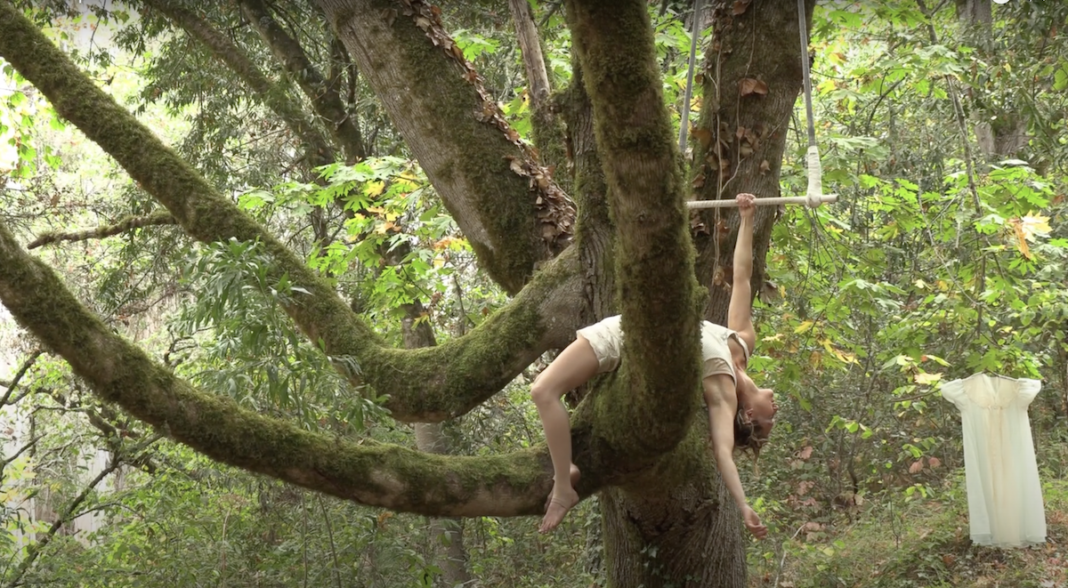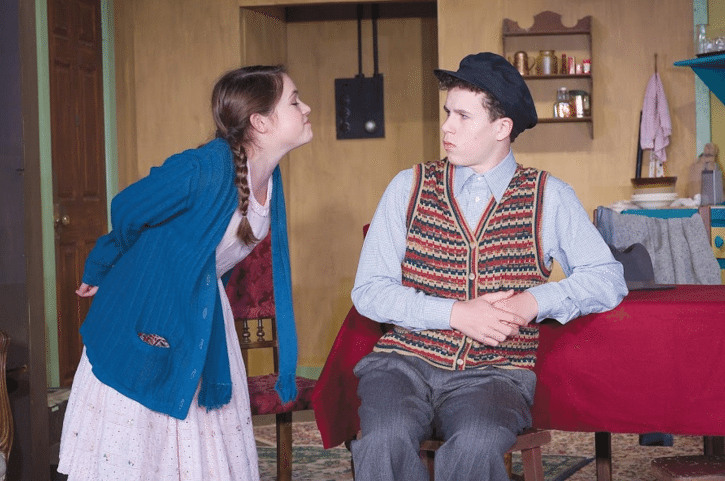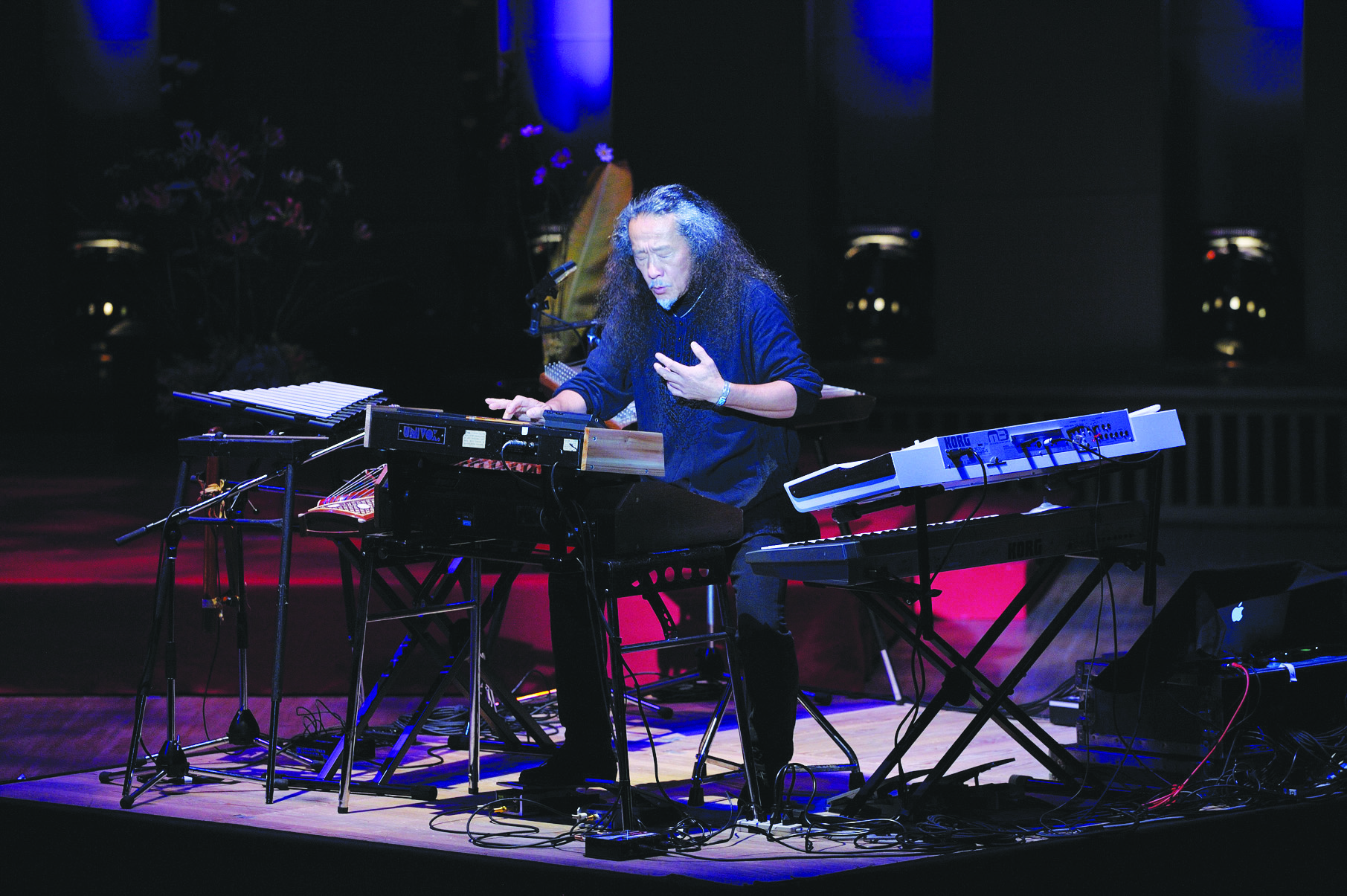It may seem obvious that an opera built around the true story of an abusive relationship will make for challenging research, but it was still surprisingly emotional speaking with Andrea “Anny” Densmore and her son, Tony Owen, on the creation of Eve, An Opera.
Eve is not so named, as some may think, after the biblical character, though it’s fitting enough. Perhaps portentously, Eve is Densmore’s middle name. Eve is a based-on-a-true-story 13-piece opera that traverses and blends genres to create an utterly unique tale of oppressed and oppressor. R&B, aerial dancers, jazz, ballet and members of the Oakland Interfaith Gospel Choir Ensemble—to name a few—tell the story of Eve, the innocent protagonist, who falls prey to evil, in the form of an abuser, one fated night, and only emerges 18 years later.
The piece takes Eve, and the audience, through the entire process, from ultimate highs to excruciating lows.
“This girl was exploring and seeking and trying to understand the world, and there was a time when she just stepped through the wrong door,” Densmore said over the phone.
Densmore knows this all too well—along with being the composer and co-creator of Eve, she is also the inspiration for the main character. This opera, though a fiction, is also partially her story, and by proxy, that of her sons, Tony and Hobie. And though composed as an act of healing and empowerment, both Densmore and Owen conveyed to me how challenging this process has been for them, stirring an incredible amount of healing ready to be done.
For Densmore, this started almost 44 years ago, in 1978. Born in 1960, the daughter of a philosophy professor father and songwriter activist mother, she came of age in the height of the Rolling Stones, Beatles era, in what sounds like an almost idyllic childhood.
“My mother was learning to play guitar, and there was music in my house all the time, and dancing. And my dad is an adventurer and sailor, so we were always traveling out to remote amazing places, sleeping under the stars, swimming in the Sea of Cortez while we sailed.”
She grew up on the beaches of Los Angeles, where she became a beach volleyball player. It took her to UC Berkeley on a full ride, which was going well until, in her third quarter, she missed her ride back to LA for spring break and ended up at a Jerry Garcia Band concert. Too young to get in, she ended up hanging out with some guys who took her to a house in Oakland which was, in her words, a cult. Two weeks later, she dropped out of school.
Densmore opted not to mention the name of the cult, or the location of the house. She doesn’t want to stir up anything, and the cult—though, according to her, they don’t consider themselves this way—is still operative today.
After meeting the man who would become her children’s father, Densmore found herself in an abusive relationship that lasted 18 years, out of which, among other things, came her two sons, Antonio “Tony” Owen and Hobie Owen, and this opera.
And this opera has been a long time in the making. When Densmore was finally able and ready to go back to school, she attended Dominican University, where she took composition classes and wrote a cathartic memoir on her story. She described it as a “purge” experience, full of poetry, rhyme and memory. Encouragement from her teachers—specifically, a professor, Thomas Burke, who told her, “you should write an opera”—caused her to consider combining her memoir and her budding composition skills.
In 2016-17, Densmore went to the California Institute of Integral Studies (CIIS), thinking she would make her story into a film. She created a piece, originally called Bach’s Daughter, which she performed first at a house concert in 2017. Out of Bach’s Daughter, Eve budded—the piece is still part of the opera—which began to really take shape with the help of her lifelong friend and co-creator, Kim Bender, and her sons, Hobie and Tony.
While Hobie Owen plays a more behind-the-scenes role, helping with photo and video assets, Tony Owen, a graduate of California Jazz Conservatory and a composer, arranger, producer and professional guitarist, came on as co-creator, composer, writer and performing musician in Eve.
It was Tony Owen’s idea to create the character Eve, a fictional protagonist who could move the audience through a narrative. He and his mother collaborated closely on crafting this character, who both served to illustrate the narrative and give the family a bit of space from it, and a bit of privacy.
“I never thought I would do this, but it came so easy, in a way. I’d spent so much time with the story, it was almost as though I knew what the scenes needed to be. It was kind of miraculous, and a strange feeling—I stepped into a role I never thought I would do and felt immediately that I was the person to do it.”
In Densmore is a woman who experienced, and eventually escaped, domestic violence and is finding healing and catharsis through sharing her story with the world. She can inspire others in similar situations, and continue to shed light on the dangerous reality of domestic abuse.
Tony Owen is the son who, not immediately abused by his father, nor witness to the abuse of his mother, is working to come to terms with his origin story. In the first few performances of Eve, he spoke up unprompted at the show’s end, on behalf of his father, who was also a victim of domestic abuse, and someone he witnessed suffer tremendously before finally passing away just before COVID broke out.
“This has brought up a whole lot for me. It’s opened up some cans of worms, but I think we’re all ready to face it,” he said over the phone. “My whole life, I’ve been fighting against my mom’s demonization story, because it’s kind of our horror story. Once I got to know my father, and became aware of the concept of multi-generational trauma, I started to see this monster as more of a sick animal.”
Owen was brave, in our conversation, speaking candidly about his suffering during childhood and into his early adulthood, before finding his path. He was candid too, about his concerns in endeavoring to understand, and humanize his father. He treaded lightly but honestly through his thought process and experiences, which he is still investigating and digesting.
“What’s been really uncomfortable for me to reckon with is having a masculine voice, in the temple of the healing woman. After my impromptu speech, I had a very polarized reaction—some people came up to me, thanking me; others were triggered.”
Owen is working on understanding his mother’s story, his father’s story and his own. He, like his mother, is working to process his trauma. And because this route—the opera—has been the one his mother chose to process, and because it’s so public, he wanted to participate in the telling of the story. He’s hoping to understand, in more detail, the role of the abused male—in this case, his father—who then becomes the abuser. And he’s also trying to understand how to hold someone accountable for their actions and forgive them at the same time.
“I’m working on understanding my mother’s story, which she has a right to, while also understanding how we all move forward, and what role compassion plays in all of it.”
Densmore and her sons are healing the hard way. They’re looking at the past, together, opening the old wounds—to the public, no less—and working to heal themselves, past, present and future. In the process, they’re looking to bolster others in similar situations. It’s powerful medicine. And an ongoing process. This will perhaps not be the last opera we see from the family.
‘Eve, An Opera’ is heading to the San Francisco Palace of Fine Arts on Oct, 28 for a one night show. For tickets and more information, visit www.eveopera.com.









